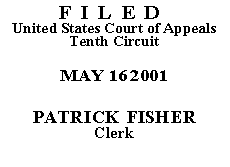

| MADISON STEWART WILKINS,
Plaintiff-Appellant, v. COLORADO DEPARTMENT OF SOCIAL SERVICES DIVISION OF VOCATIONAL REHABILITATION, Defendant-Appellee. |
|
Pro se plaintiff Madison Stewart Wilkins appeals from the district court's dismissal of her complaint alleging negligence claims against defendant arising from an incident that occurred on March 14, 1979. The district court liberally construed her complaint as alleging violations of 42 U.S.C. § 1983, and based its ruling on 1) the statute of limitations applicable to such actions under Colo. Rev. Stat. § 13-80-102(1), 2) defendant's Eleventh Amendment immunity from suit, and 3) plaintiff's failure to assert her claims against a person acting under the color of state law. The district court also noted that, to the extent plaintiff's claims could be considered to have a common law basis, they would be barred by the Colorado Governmental Immunity Act, Colo. Rev. Stat. § 24-10-106. Plaintiff's post-judgment motions were denied.(1)
On appeal, plaintiff appears to contend that she was allowed to file her claims in state court in 1995, that the district court erred in dismissing her case after granting her leave to proceed without prepayment of costs or fees and in failing to hold a scheduled motions hearing, and that her underlying negligence claims have merit entitling plaintiff to her day in court. She requests oral argument and contends that her claims are protected by both Title VII and the Americans with Disabilities Act (ADA). Finally, she appears to assert that the Eleventh Amendment and § 1983 are not applicable to her claims because they were adopted after 1979.
We must affirm the district court's dismissal of plaintiff's claims in light of the lapse of over nineteen years between the incident of which she complains and the initial filing of her case in district court. Applicable statutes of limitations require that litigants file their claims within a certain time period. These statutes
are designed to promote justice by preventing surprises through the revival of claims that have been allowed to slumber until evidence has been lost, memories have faded, and witnesses have disappeared. The theory is that even if one has a just claim it is unjust not to put the adversary on notice to defend within the period of limitation and that the right to be free of stale claims in time comes to prevail over the right to prosecute them.
Order of R.R. Telegraphers v. Ry. Express Agency, Inc., 321 U.S. 342, 348-49, (1944).
In her reply brief, plaintiff argues for the first time that she is protected by Title VII and the ADA. We generally do not address new theories on appeal. Walker v. Mather (In re Walker), 959 F.2d 894, 896 (10th Cir. 1992). Nonetheless, under any theory, plaintiff's claims are barred by the two-year statute of limitation found in Colo. Rev. Stat. § 13-80-102, applicable to negligence claims arising in Colorado, including claims under § 1983. See Crumpton v. Perryman, 956 P.2d 670, 672 (Colo. Ct. App. 1998).
Plaintiff's assertions that the state courts allowed her to file her negligence claims in 1995 and her complaints about the district court's failure to hold a scheduled motions hearing cannot overcome the effect of the applicable statute of limitations. "Statutes of limitations do not bar the filing of claims, but rather establish time limitations within which specified claims may be filed. Such statutes are designed to promote justice, discourage unnecessary delay and forestall the prosecution of stale claims." Estate of Stevenson v. Hollywood Bar & Café, Inc., 832 P.2d 718, 721 (Colo. 1992). As a matter of law, plaintiff's claims are barred by the statute of limitations.
Finally, contrary to plaintiff's assertions, it is clear that both the Eleventh Amendment and § 1983 predate plaintiff's claims. See Hans v. Louisiana, 134 U.S. 1 (1890) (nineteenth century case discussing the Eleventh Amendment); Quern v. Jordan, 440 U.S. 332, 342 (1979) (discussing the enactment of § 1983 as part of the Civil Rights Act of 1871).
The judgment of the United States District Court for the District of Colorado is AFFIRMED. All pending motions are DENIED.
Entered for the Court
Circuit Judge
*. This order and judgment is not binding precedent, except under the doctrines of law of the case, res judicata, and collateral estoppel. The court generally disfavors the citation of orders and judgments; nevertheless, an order and judgment may be cited under the terms and conditions of 10th Cir. R. 36.3.
1. The district court denied plaintiff's motion to proceed on appeal without prepayment of costs or fees, and plaintiff has reurged that motion on appeal. Upon consideration, we grant plaintiff's motion to proceed in forma pauperis under 28 U.S.C. § 1915(a).